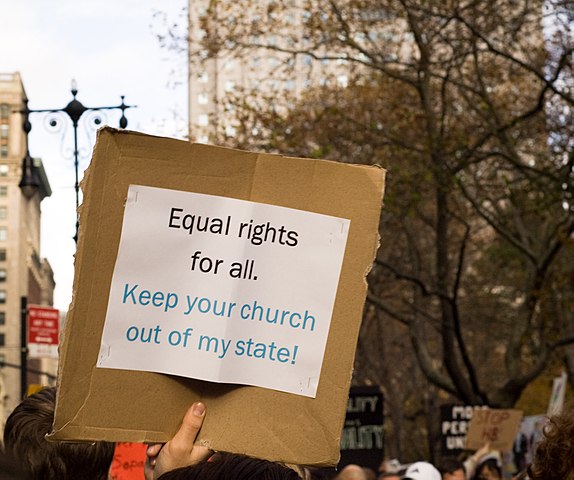Is the United States a Christian nation? Doesn’t our money say “one nation under God” on it? The answer is complicated, but the short answer is that the United States was not founded on the basis of religion, and if you don’t like that, you can take it up with the Founding Fathers. In short, religion should be separated from politics.
President Donald Trump’s Muslim ban had the full support of the Religious Right in part because they believe that the U.S. government should show favoritism toward Christians. Often you hear Republicans describe America as a “Christian nation.”
Manifest Destiny and the Religious Right: Church State Separation
This form of bigotry and religious manifest destiny allows Republicans to close their hearts to the plights of Muslim refugees fleeing war-torn countries, some of which the U.S. has played a hand in destabilizing.
The only exceptions they want to make regarding refugees from the Middle East are for Christian minorities that they feel are more worthy than those refugees who believe in Islam.
Shortly after Trump’s Muslim ban, he stated that he would consider allowing Christian refugees in from countries listed in his executive order.
But it seems that the Founding Fathers had a different perspective when it came to government endorsement of Christianity and its relationship with Muslim countries. Between 1801-1805 and 1815-1816, the U.S. was involved in a conflict known as the Barbary Wars, which is also known as the Barbary Coast Wars or Tripolitanian Wars. The wars pitted the U.S. and Sweden against four North African states, collectively known as the “Barbary States.”
Those states were Tripoli, Algiers, Tunis, and the independent Sultanate of Morocco. All four of these states were ruled by Muslim governments, and they used piracy as a way to harass commerce being conducted by U.S. and Swedish merchant ships. They also held ship crews for ransom as well as demanded that the U.S. pay tribute to the rulers of the Barbary States.

Thomas Jefferson and the Separation of Church and State
President Thomas Jefferson refused to pay. However, the U.S. would regularly pay ransom for captured sailors. When Jefferson and John Adams traveled to London in 1786 to negotiate with Tripoli’s envoy, they asked the Tripolitanian ambassador, Sidi Haji Abdrahaman, how his country felt justified “concerning the ground of the pretensions to make war upon nations who had done them no injury?”
According to a letter from Adams and Jefferson, the ambassador replied:
“It was written in their Koran, that all nations who should not have acknowledged their authority were sinners, that it was their right and duty to make war upon them wherever they could be found, and to make slaves of all they could take as Prisoners, and that every Musselman who should be slain in battle was sure to go to Paradise.“
So let’s be crystal clear.
The U.S. was at war with “radical Islamic terrorists” who brazenly hijacked U.S. ships, killed and kidnapped their crews, and demanded that the U.S. pay tribute on top of individual ransoms.
Conservatives would probably envision an “alternate history” where the U.S. military stormed the beaches and wiped out the terrorists. However, real history would most likely prove to be a bitter disappointment for our misguided romanticizing friends on the right.
The Treaty of Tripoli
While the U.S. Navy and the newly formed Marine Corps ultimately proved instrumental in ending the Barbary wars, the U.S. did not go in and topple any governments. In fact, in 1796, President John Adams signed a treaty known as the Treaty of Tripoli.
And it wasn’t as though the U.S. saw itself in a position to arrogantly make demands (ala Donald Trump). Instead, they had to rely on a manner of diplomacy that would make Republicans scream in outrage should it be copied today. Here’s what Article 11 of the Treaty of Tripoli said:
“As the government of the United States of America is not in any sense founded on the Christian Religion, — as it has in itself no character of enmity against the laws, religion or tranquility of Musselmen (Muslims), — and as the said States never have entered into any war or act of hostility against any Mehomitan (Muslim or Islamic) nation, it is declared by the parties that no pretext arising from religious opinions shall ever produce an interruption of the harmony existing between the two countries.”
If made today, you can see how such a statement would make neocons shake with indignant fury.
However, for all their many faults, the Founding Fathers believed in reason above nationalistic posturing, something Donald Trump supporters would never understand in a million years.
It’s not about the separation of church and state pros and cons. It’s the fact that it’s how our country was set up, and any argument suggesting otherwise is false.




